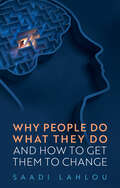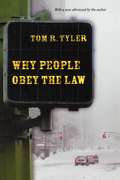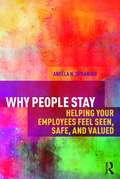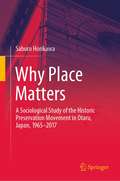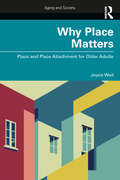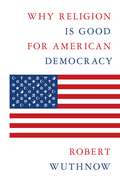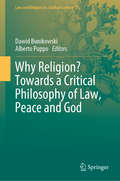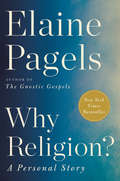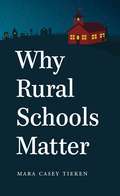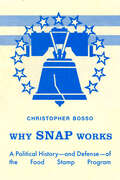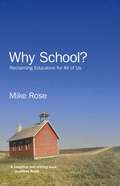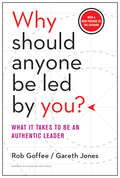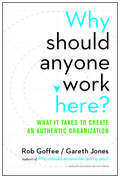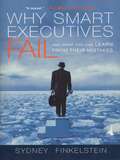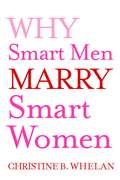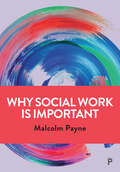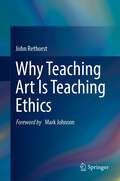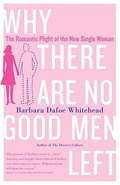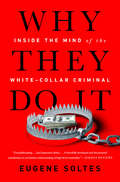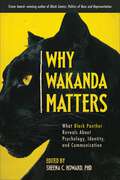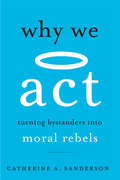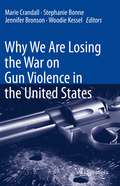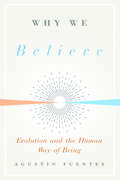- Table View
- List View
Why People Do What They Do: And How to Get Them to Change
by Saadi LahlouWhy do people behave in the way they do and how can we get them to change? Drawing on a large body of empirical research, Lahlou shows that people’s behaviour is predictable and shaped by ‘installations’ combining three sets of factors: what is technically possible (affordances of the environment), what people are able to do (embodied competences), and what monitors and controls behaviour (social regulation). These channel our behaviour and incline us to act one way or another in specific circumstances – in the way, for example, that when you travel by plane, the steps you take from the moment you check in to the moment you take your seat are fixed and predictable. Lahlou shows how we can intervene at each of the three levels of installations to change human behaviour, and how we can combine them for greater effectiveness and direction, with a robust, step-by-step method. Because the method is so powerful, Lahlou also provides ethical guidelines and caveats about using these interventions to improve society, not just one's own business and interests. This concise and authoritative book, packed with real-world examples, will be of interest to anyone concerned about how to tackle the difficult problems of today’s world. At long last, a book that offers realistic, concrete steps for changing our ways.
Why People Obey The Law
by Tom R. TylerPeople obey the law if they believe it's legitimate, not because they fear punishment--this is the startling conclusion of Tom Tyler's classic study. Tyler suggests that lawmakers and law enforcers would do much better to make legal systems worthy of respect than to try to instill fear of punishment. He finds that people obey law primarily because they believe in respecting legitimate authority. In his fascinating new afterword, Tyler brings his book up to date by reporting on new research into the relative importance of legal legitimacy and deterrence, and reflects on changes in his own thinking since his book was first published.
Why People Stay: Helping Your Employees Feel Seen, Safe, and Valued
by Angela N. SprangerWhy People Stay is the result of a doctoral study that revealed participants’ sense of commitment (to the organization, to the team, to the mission, or to something else). This was in spite of numerous experiences of antisocial workplace behavior, or AWB, reported by each participant. The incidents reported included perceptions of disrespect and subtle discourtesy, appropriation of credit for work not performed, deliberate poor work performance, racial harassment, abusive language, abusive supervision, bullying and threats of violence, to other demeaning behaviors. Over 70 unique instances were reported, in all, by just 11 participants over the course of some 30 hours of interviews. Yet they all stayed in their workplace. Why? And what does this choice suggest about employee engagement, in toxic workplaces or work groups? This book explores these questions, and more, and sounds an alarm to executives and culture monitors that the root cause of your human capital losses is that your people do not feel seen, safe, and valued and you can change that. It looks at organizational commitment and organizational engagement in an environment where it can be difficult to remain authentically committed in the presence of AWB. The participants in this study were queried as to just why they stayed under such conditions. The aim of this book is to share their surprising results. This positive book about negative experiences is essential reading for executives, HR and organizational development professionals, as well as students at both postgraduate and undergraduate levels.
Why Place Matters: A Sociological Study of the Historic Preservation Movement in Otaru, Japan, 1965–2017
by Saburo HorikawaThis book is based on the author’s 33 years of intensive fieldwork. It chronicles a major movement that shaped the preservation policy in Japan in the 1980s and 1990s, providing “thick descriptions” of preservationists that are not available anywhere else in English. It also provides clear answers to a series of pressing questions about preservationists: are they building-huggers, are they selfish and myopic home-owners, or are they merely obstacles to urban planning and urban renewal? Since 1984, Saburo Horikawa, Professor of Sociology at Hosei University in Tokyo, has continuously studied the movement to preserve the Otaru Canal in Otaru, Japan. This book shows that the preservation movement was neither conservative nor an obstacle. Rather, the movement sought to promote changes in which the residents’ “place” would continue to be theirs. As such, the word “preservation” does not mean the prevention of growth and development, but rather its control. As is shown in this study, preservation allows for and can even promote change. The original Japanese version of this book (published by the University of Tokyo Press) has won 3 major academic awards; most notably, “The Ishikawa Prize”, the highest award bestowed by the City Planning Institute of Japan. It is extremely unusual that a sociology book should receive such important recognition from the city planning discipline.
Why Place Matters: Place and Place Attachment for Older Adults (Aging and Society)
by Joyce WeilWhy Place Matters reassesses what is known and traditionally understood about the relationship older adults have with place over time and in later life. Building from notions that affirm there is no single "right" place to age or grow older, Joyce Weil fixes her analytical focus on older adults’ agency in assessing place, the ways a person's fit in a place evolves over time, and the complexity and nuance of how older adults derive and also attach meanings to place. Even in the presence of a rich literature and ongoing body of research on older adults and their relationship to place, this book argues for more attention to be paid to the ways in which the interaction of person and place is fluid and dependent on personal and individual circumstances as well as societal and structural ones. Drawing upon theoretical explanations and quantitative models, including the author's own integrated measure, and a range of lived experiences and personal accounts of place, this book unpacks and broadens the meanings ascribed to place in later life. Readers across the fields of gerontology, sociology, geography, planning, and health and social care will find a fresh perspective and truly innovative and comprehensive way of thinking about place and aging.
Why Religion Is Good for American Democracy
by Robert WuthnowHow the actions and advocacy of diverse religious communities in the United States have supported democracy’s development during the past centuryDoes religion benefit democracy? Robert Wuthnow says yes. In Why Religion Is Good for American Democracy, Wuthnow makes his case by moving beyond the focus on unifying values or narratives about culture wars and elections. Rather, he demonstrates that the beneficial contributions of religion are best understood through the lens of religious diversity. The religious composition of the United States comprises many groups, organizations, and individuals that vigorously, and sometimes aggressively, contend for what they believe to be good and true. Unwelcome as this contention can be, it is rarely extremist, violent, or autocratic. Instead, it brings alternative and innovative perspectives to the table, forcing debates about what it means to be a democracy.Wuthnow shows how American religious diversity works by closely investigating religious advocacy spanning the past century: during the Great Depression, World War II, the civil rights movement, the debates about welfare reform, the recent struggles for immigrant rights and economic equality, and responses to the coronavirus pandemic. The engagement of religious groups in advocacy and counteradvocacy has sharpened arguments about authoritarianism, liberty of conscience, freedom of assembly, human dignity, citizens’ rights, equality, and public health. Wuthnow hones in on key principles of democratic governance and provides a hopeful yet realistic appraisal of what religion can and cannot achieve.At a time when many observers believe American democracy to be in dire need of revitalization, Why Religion Is Good for American Democracy illustrates how religious groups have contributed to this end and how they might continue to do so despite the many challenges faced by the nation.
Why Religion? Towards a Critical Philosophy of Law, Peace and God (Law and Religion in a Global Context #2)
by Dawid Bunikowski Alberto PuppoThis book examines the relation between religion and jurisprudence, God, and peace respectively. It argues that in order to elucidate the possible role religion can play in the contemporary world, it is useful to analyse religion by associating it with other concepts. Why peace? Because peace is probably the greatest promise made by religions and the greatest concern in the contemporary world. Why jurisprudence? Because, quoting Kelsen’s famous book "Peace through Law", peace is usually understood as something achievable by international legal instruments. But what if we replace "Peace through Law" with "Peace through Religion"? Does law, as an instrument for achieving peace, incorporate a religious dimension? Is law, ultimately, a religious and normative construction oriented to peace, to the protection of humanity, in order to keep humans from the violence of nature? Is the hope for peace rational, or just a question of faith? Is religion itself a question of faith or a rational choice? Is the relatively recent legal concept of “responsibility to protect” a secular expression of the oldest duty of humankind?The book follows the structure of interdisciplinary research in which the international legal scholar, the moral philosopher, the philosopher of religion, the theologian, and the political scientist contribute to the construction of the necessary bridges. Moreover, it gives voice to different monotheistic traditions and, more importantly, it analyses religion in the various dimensions in which it determines the authors' cultures: as a set of rituals, as a source of moral norms, as a universal project for peace, and as a political discourse.
Why Religion?: A Personal Story
by Elaine PagelsOne of PW’s Best Books of the YearOne of Amazon’s Best Books of the MonthWhy is religion still around in the twenty-first century? Why do so many still believe? And how do various traditions still shape the way people experience everything from sexuality to politics, whether they are religious or not? In Why Religion? Elaine Pagels looks to her own life to help address these questions.These questions took on a new urgency for Pagels when dealing with unimaginable loss—the death of her young son, followed a year later by the shocking loss of her husband. Here she interweaves a personal story with the work that she loves, illuminating how, for better and worse, religious traditions have shaped how we understand ourselves; how we relate to one another; and, most importantly, how to get through the most difficult challenges we face. Drawing upon the perspectives of neurologists, anthropologists, and historians, as well as her own research, Pagels opens unexpected ways of understanding persistent religious aspects of our culture. A provocative and deeply moving account from one of the most compelling religious thinkers at work today, Why Religion? explores the spiritual dimension of human experience.
Why Rural Schools Matter
by Mara Casey TiekenFrom headlines to documentaries, urban schools are at the center of current debates about education. From these accounts, one would never know that 51 million Americans live in rural communities and depend on their public schools to meet not only educational but also social and economic needs. For many communities, these schools are the ties that bind. Why Rural Schools Matter shares the untold story of rural education. Drawing upon extensive research in two southern towns, Mara Tieken exposes the complicated ways in which schools shape the racial dynamics of their towns and sustain the communities that surround them. The growing power of the state, however, brings the threat of rural school closure, which jeopardizes the education of children and the future of communities. With a nuanced understanding of the complicated relationship between communities and schools, Tieken warns us that current education policies--which narrow schools' purpose to academic achievement alone--endanger rural America and undermine the potential of a school, whether rural or urban, to sustain a community. Vividly demonstrating the effects of constricted definitions of public education in an era of economic turmoil and widening inequality, Tieken calls for a more contextual approach to education policymaking, involving both state and community.
Why SNAP Works: A Political History—and Defense—of the Food Stamp Program
by Christopher John BossoThe first book to tell the whole story of SNAP and to explain why all Americans should support it. The Supplemental Nutrition Assistance Program is the nation’s largest government effort for helping low-income Americans obtain an adequate diet. How did SNAP, formerly the food stamp program, evolve from a Depression-era effort to use up surplus goods into America’s foundational food assistance program? And how does SNAP survive? Incisive and original, Why SNAP Works is the first book to provide a comprehensive history and evaluation of the nation’s most important food insecurity and poverty alleviation effort. Everyone has an opinion about SNAP, not all of them positive, but its benefits are felt broadly and across party lines. Christopher Bosso makes a clear, nuanced, and impassioned case for protecting this unique food program, exploring its history and breaking down the facts for readers across the political spectrum. Why SNAP Works is an essential book for anyone concerned about food access, poverty, and the "welfare system" in the United States.
Why School?
by Mike RoseWhy School? is a little book driven by big questions. What does it mean to be educated? What is intelligence? How should we think about intelligence, education, and opportunity in an open society? Drawing on forty years of teaching and research and "a profound understanding of the opportunities, both intellectual and economic, that come from education" (Booklist), award-winning author Mike Rose reflects on these and other questions related to public schooling in America. He answers them in beautifully written chapters that are both rich in detail and informed by an extensive knowledge of history, the psychology of learning, and the politics of education.This paperback edition includes three new chapters showing how cognitive science actually narrows our understanding of learning, how to increase college graduation rates, and how to value the teaching of basic skills. An updated introduction by Rose, who has been hailed as "a superb writer and an even better storyteller" (TLN Teachers Network), reflects on recent developments in school reform. Lauded as "a beautifully written work of literary nonfiction" (The Christian Science Monitor) and called "stunning" by the New Educator Journal, Why School? offers an eloquent call for a bountiful democratic vision of the purpose of schooling.
Why Should Anyone Be Led by You? With a New Preface by the Authors
by Gareth Jones Rob GoffeeAre you an authentic leader?Too many companies are managed not by leaders but by mere role players and faceless bureaucrats. What would it take to replace these empty suits with real leaders-men and women who are confident in who they are and what they stand for and who truly inspire people to achieve extraordinary results?Rob Goffee and Gareth Jones argue that leaders don't become great by aspiring to a list of universal character traits. Rather, effective leaders are authentic: they deploy individual strengths to engage followers' hearts, minds, and souls. Authentic leaders are skillful at consistently being themselves, even as they alter their behavior to respond effectively to changing contexts. In short, the authors present a powerful case: that it takes "being yourself, in context, with skill" to be a successful, authentic leader-and they show you how to do exactly that.In this lively and practical book, Goffee and Jones draw from extensive research to reveal how to hone and deploy your unique leadership assets while managing the inherent tensions at the heart of successful leadership: when to show emotion and when to withhold it, how to get close to followers while maintaining an appropriate role distance, and maintaining your individuality while "conforming enough" to gain traction and lead change. Underscoring the inherently social nature of leadership, the book also explores how leaders can stay attuned to the needs and expectations of followers.Why Should Anyone Be Led by You? will forever change how we view, develop, and practice the art of leadership, wherever we live and work.
Why Should Anyone Work Here?
by Gareth Jones Rob GoffeeImagine designing the best company on earth to work for . . .What would that company be like? How would you build and sustain it? As a leader, you need to know. In the past, businesses made people conform to the organization's needs. But the old paradigm has shifted. Now leaders must transform their organizations so that they attract the right people, keep them, and inspire them to do their best work. How do you create a culture people want to belong to?In this powerful and necessary follow-up to the classic Why Should Anyone Be Led by You?, leadership and organizational sages Rob Goffee and Gareth Jones identify and illuminate the six key organizational attributes to do just that. In separate chapters, they delve deeply into each one:1. Let people be themselves2. Practice radical honesty3. Magnify people's strengths4. Stand for authenticity (more than shareholder value)5. Make work meaningful6. Make simple rulesWith vivid stories and examples from global companies, the authors illustrate the kind of strong, attractive workplace culture that leads to sustained high performance. They also provide ways of assessing how your company is doing and describe the tensions and trade-offs that leaders must manage as they transform their organizations.Why Should Anyone Work Here? is the question all contemporary organizational leaders must constantly ask themselves if they want to survive and thrive in the new world. This book will help them answer that question.
Why Smart Executives Fail
by Sydney FinkelsteinA definitive study of executive failures-why they happen and how to prevent them. There's a scenario that keeps repeating itself in today's business climate. A company is voted one of the most admired in the world. Then three or four years later, it's in dire financial trouble. A CEO is celebrated on the covers of BusinessWeek, Forbes, and Fortune. Soon after, the company is in the midst of a disastrous merger or some other fiasco. What goes wrong in these cases? Usually it seems that the top management made some incredibly stupid mistake. But the people responsible are almost always remarkably intelligent and usually have terrific track records. Even more puzzling than the fact that brilliant managers can make bad mistakes is the way they so often magnify the damage. Once a company has made a bad misstep, it often seems as though it can't do anything right. How does this happen? Instead of rectifying their mistakes, why do business leaders regularly make them worse? To answer these questions, Sydney Finkelstein has carried out the largest research program ever devoted to business breakdowns. In Why Smart Executives Fail, he uncovers-with startling clarity and unassailable documentation-the causes regularly responsible for major business breakdowns. Why Smart Executives Failrelates the stories of great business disasters and demonstrates that there are specific, identifiable ways in which many businesses regularly make themselves vulnerable to failure. The result is a truly indispensable, practical, must-read book that explains the mechanics of executive breakdowns, how to avoid them, and what to do about them if they happen.
Why Smart Men Marry Smart Women
by Christine WhelanFor years, it's been "common knowledge" that once a woman hits thirty, her chances of finding a husband diminish to the point of despair. That men are intimidated by a woman's career success, preferring docile helpmates to ambitious achievers. That women are biologically driven to seek a strong provider. That the higher a woman's IQ, the less likely she is to marry, let alone have babies...leaving single, successful women to ask themselves: Are men intimidated by smart women? In Why Smart Men Marry Smart Women, Christine B. Whelan shatters the myth that high-achieving women are at a disadvantage in the marriage market. There's good news for the millions of American SWANS (Strong Women Achievers, No Spouse): that today's smart, successful women marry at the same rates as all other women -- and that more income and education may in fact increase a woman's chances of marriage. What's more, as Dr. Whelan shows through newly released U.S. Census data, a large-scale Harris Interactive survey commissioned especially for this book, plus extended interviews conducted in cities nationwide, this profound demographic shift shows every sign of progressing. That means that the "success penalty" that has endured for generations is, as soon as 2010, destined for the history books. Accomplished daughters, sisters, and friends (not to mention their mothers) can finally stop worrying that the twin pinnacles of personal and professional happiness are inherently unattainable. In fact, smart men do marry SWANS. Ninety percent of high-achieving men surveyed want a woman who is as intelligent or more intelligent than they are. And two-thirds of men said they believed smart women make better mothers. Pairing cutting-edge research with sound advice, Dr. Whelan brings to mind what smart women everywhere have long known in their hearts: that the goal is not just to get married, but to have a good marriage, and to lead a fulfilled life.
Why Social Work is Important: Identity, Role and Practice
by Malcolm PayneWhat is social work’s contribution to humanity and society? Best-selling author Malcolm Payne offers a toolkit for social work practitioners and students to bring key issues about their practice and social role to life, drawing on case examples and research. Starting from the principle that human beings are social beings, he showcases: • innovative analysis of how social work’s identity and diverse streams of thought inform social professions globally; • social work’s dual practice aims of developing human flourishing and social capital; • community-near co-production, engaging agencies, communities and service users with practitioners from different professions to meet shared aims for social transformation; • how populist politics and monetising economics corrodes deeply-held human and social values. Malcolm Payne looks forward to social work practice and provision that puts people and social relationships first in meeting the challenges of twenty-first century caring and environmental crises.
Why Teaching Art Is Teaching Ethics
by John RethorstThis exhaustively-researched, carefully-focused book asks whether imagination, emotion and art can enlighten our sense of right and wrong, looking at this question through the lens of moral philosophy with contributions from cognitive science, psychology and neurology.If moral thinking is simply logical reasoning or following God-given law, why did the poet Shelley say that “the great instrument of moral good is the imagination”? Why does ethical reasoning tend towards absolutes: something is either right or wrong, period, while a thoughtful minority values the “priority of the particular” – that unique aspects of a situation may come closer to the heart of the matter than any general rules could? Are emotions, as many philosophers in history have theorized, only a distraction from the clear perception of duty, or do feelings add something important, even critical, to how we judge good and bad, right and wrong? Can great works of art and literature embody imagination, the particular, and emotions to illuminate human life in ways crucial to ethical thinking?This book introduces an original idea in philosophy, “moral density,” which for the first time elucidates the profound relation between art and ethics. Written for the literate layperson, an academic or technical background is not necessary, so this book will be of interest not only to philosophers and educators, but to all who are concerned with what is good, and how to see it and teach it.
Why Theatre Matters
by Kathleen GallagherWhat makes young people care about themselves, others, their communities, and their futures? In Why Theatre Matters, Kathleen Gallagher uses the drama classroom as a window into the daily challenges of marginalized youth in Toronto, Boston, Taipei, and Lucknow. An ethnographic study which mixes quantitative and qualitative methodology in an international multi-site project, Why Theatre Matters ties together the issues of urban and arts education through the lens of student engagement. Gallagher's research presents a framework for understanding student involvement at school in the context of students' families and communities, as well as changing social, political, and economic realities around the world.Taking the reader into the classroom through the voices of the students themselves, Gallagher illustrates how creative expression through theatre can act as a rehearsal space for real, material struggles and for democratic participation. Why Theatre Matters is an invigorating challenge to the myths that surround urban youth and an impressive study of theatre's transformative potential.
Why There Are No Good Men Left: The Romantic Plight of the New Single Woman
by Barbara Dafoe WhiteheadA hard-hitting, groundbreaking exploration of the new mating conditions that are changing the face of love, commitment, and marriage as we know it. A double revolution is at work in modern American love: A revolution in higher education has created the most professionally accomplished and independent generation of young women in history, and a revolution in mating has created a prolonged and perplexing search for Mr. Right. Based on extensive research and interviews,Why There Are No Good Men Leftexplores the romantic plight of this high-status woman with findings that are sure to rouse debate. Cultural historian, Barbara Dafoe Whitehead documents the new social climate in which the demands of work, the epidemic of cohabitation, the disappearance of courtship, and the exacting standards of educated women are leading them to stay single longer-and to find the search for a mate even harder when the time is right. From the frontlines of college, where dating is dead, to the trenches of corporate solitude, Whitehead reports on a wholesale shift that has stacked the marriage deck against the best and brightest women. The thirty-something, perplexed single woman is today's new cultural icon. Why There Are No Good Men Leftis the first book to take a serious approach to analyzing where she came from and to ask how she can realize her dreams of lasting love. From the Hardcover edition.
Why They Die: Civilian Devastation in Violent Conflict
by Rothbart Daniel Korostelina Karina V."A welcome contribution to our understanding of the process at work in societies in conflict---a process that can occur even before the fighting begins---this book convincingly argues the need to bring civilians, who are often not at the center of conflict analysis, to the forefront of any discussion of conflict through an examination of anti-civilian ideology and the construction of the Other in terms of the positioning of boundaries. " ---Kristen P. Williams, Clark University "The authors convincingly dismiss conventional accounts---collateral damage is unavoidable, war is hell, etc. ---and insist that the insights of identity studies can provide a more complete perspective on this issue. " ---John Parry, Lewis & Clark Law School "Why They Dieis a work of imagination and insight. Based on wide reading and deep reflection, the authors have adopted a case study method to illustrate why it is that civilians are so often targeted in modern conflict, and why this development is such a departure from earlier forms of warfare. Rather than being that unfortunate phenomenon 'collateral damage,' as so often claimed by military theorists, the modern world has seen a situation where the destruction of civilian lives has all too often become the object of combatant behaviors. Rothbart and Korostelina have shown why this has happened, and how such behaviors can be explained. All in all, this is an excellent and worthy addition to a growing literature of mass murder, mayhem, and destruction. " ---Paul R. Bartrop, Bialik College, Melbourne, Australia Why do civilians suffer most during times of violent conflict? Why are civilian fatalities as much as eight times higher, calculated globally for current conflicts, than military fatalities? InWhy They Die, Daniel Rothbart and Karina V. Korostelina address these questions through a systematic study of civilian devastation in violent conflicts. Pushing aside the simplistic definition of war as a guns-and-blood battle between two militant groups, the authors investigate the identity politics underlying conflicts of many types. During a conflict, all those on the opposite side are perceived as the enemy, with little distinction between soldiers and civilians. As a result, random atrocities and systematic violence against civilian populations become acceptable. Rothbart and Korostelina devote the first half of the book to case studies: deportation of the Crimean Tatars from the Ukraine, genocide in Rwanda, the Lebanon War, and the war in Iraq. With the second half, they present new methodological tools for understanding different types of violent conflict and discuss the implications of these tools for conflict resolution. Jacket photograph: © iStockphoto. com/Tina Rencelj
Why They Do It: Inside the Mind of the White-Collar Criminal
by Eugene SoltesFrom the financial fraudsters of Enron, to the embezzlers at Tyco, to the insider traders at McKinsey, to the Ponzi schemer Bernie Madoff, the failings of corporate titans are regular fixtures in the news. But what drives wealthy and powerful people to white-collar crime? Harvard Business School professor Eugene Soltes draws from extensive personal interaction and correspondence with nearly fifty former executives as well as the latest research in psychology, criminology, and economics to investigate how once-celebrated executives become white-collar criminals. The product of seven years in the company of the men behind the largest corporate crimes in history, Why They Do It is a breakthrough look at the dark side of the business world.Soltes reveals how the usual explanations fail to tell the whole story of why many seemingly successful people go over the line. White-collar criminals are not merely driven by excessive greed or hubris, nor do they usually carefully calculate costs and benefits before breaking the law. Instead, Soltes shows that most of the executives who committed crimes made decisions the way we all do—on the basis of their intuitions and gut feelings. The trouble is that these gut feelings are often poorly suited for the modern business world where leaders are increasingly distanced from the consequences of their decisions and the individuals they impact.The extraordinary costs of corporate misconduct are clear to its victims. Yet, never before have we been able to peer so deeply into the minds of the many prominent perpetrators of white-collar crime. With the increasing globalization of business threatening us with even more devastating corporate misconduct, the lessons Soltes draws in Why They Do It are needed more urgently than ever.
Why Wakanda Matters: What Black Panther Reveals About Psychology, Identity, and Communication
by Sheena C. HowardIn 2018, the Marvel Cinematic Universe finally delivered on something fans had long been waiting for: a feature film with a solo Black superhero. Black Panther introduced viewers to the stunning world of Wakanda, a fictional African country with incredible technological advancements, and to T'Challa, a young man stepping into his role as king and taking up the mantle of the Black Panther title from his late father. The unforgettable story, coupled with the film's mega-success, has undoubtedly shaped the future of superhero cinema, in addition to genuinely changing viewers' lives. Why Wakanda Matters gives this iconic film the in-depth analysis it deserves under the lens of the latest psychological concepts-as well as delving into the lasting cultural impact of this unforgettable story. Edited by Sheena C. Howard, an award-winning author, filmmaker, and scholar, Why Wakanda Matters: What Black Panther Reveals About Psychology, Identity, and Communication features a collection of essays from leading experts in a variety of fields who offer insightful perspectives on topics such as: Cognitive dissonance: The important messages within T'Challa's nuanced identity and eventual shift from nationalism to globalism. Intergenerational trauma and resistance: How N'Jadaka (aka Erik/Killmonger) identifies with the trauma that his ancestors have suffered. Social identity: How Nakia, Shuri, Okoye, and Ramonda—all empowered, intelligent, and assertive women of color—can make a lasting impression on women and girls. Collective identity: How Black Panther has created a shared fantasy for Black audience members—and why this is groundbreaking. Cultural and racial identity: What we can learn from Black Panther's portrayal of a culture virtually untouched by white supremacy. Fans of the movie and those interested in deeper discussions about the film will revel in this thought-provoking examination of all aspects of Black Panther and the power of psychology.
Why We Act: Turning Bystanders into Moral Rebels
by Catherine A. Sanderson“From bullying on the playground to sexual harassment in the workplace, perfectly nice people often do perfectly awful things. But why? In this thoughtful and beautifully written book, Sanderson shows how basic principles of social psychology explain such behavior—and how they can be used to change it. A smart and practical guide to becoming a better and braver version of ourselves.” —Daniel Gilbert, author of Stumbling on Happiness “Why do so many people stand silent when someone does something bad? If you find yourself increasingly asking that question these days, you’re not alone—and Catherine Sanderson has written the book for you.” —George Conway, founder of the Lincoln Project Why do good people so often do nothing when a seemingly small action could make a big difference? A pioneering social psychologist explains why moral courage is so rare—and reveals how it can be triggered or trained. We are bombarded every day by reports of bad behavior, from sexual harassment to political corruption and bullying belligerence. It’s tempting to blame evil acts on evil people, but that leaves the rest us off the hook. Silence, after all, can perpetuate cruelty. Why We Act draws on the latest developments in psychology and neuroscience to tackle an urgent question: Why do so many of us fail to intervene when we’re needed—and what would it take to make us step up? A renowned psychologist who has done pioneering research on social norms, Catherine Sanderson was inspired to write this book when a freshman in her son’s dorm died twenty hours after a bad fall while drinking. There were many points along the way when a decision to seek help could have saved his life. Why did no one act sooner? Cutting-edge neuroscience offers part of the answer, showing how deviating from the group activates the same receptors in the brain that are triggered by pain. But Sanderson also points to many ways in which our faulty assumptions about what other people are thinking can paralyze us. And she shares surprisingly effective and simple strategies for resisting the pressure to conform. Moral courage, it turns out, is not innate. Small details and the right training can make a big difference. Inspiring and potentially life transforming, Why We Act reveals that while the urge to do nothing is deeply ingrained, even the most hesitant would-be bystander can learn to be a moral rebel.
Why We Are Losing the War on Gun Violence in the United States
by Marie Crandall Stephanie Bonne Jennifer Bronson Woodie KesselThis edited collection of data and perspectives takes a fresh approach to gun violence prevention by addressing the question, “why are we losing the war on gun violence in America?” Although successes and failures in the prevention of gun violence are examined, it is a war we are losing, due to restrictions on research funding, entrenched historical perspectives, structural violence, and perhaps differing priorities or views on what is right or wrong.Gun violence is a public health crisis. It remains politicized and has been paralyzed with inaction. In the chapters, the authors write candidly about the challenges that have thwarted gun violence prevention, as well as highlight possible strategies for progress to save lives. Critical areas explored among the chapters include:Gun Violence, Structural Violence, and Social JusticeSchool Shootings: Creating Safer SchoolsMental Illness and Gun ViolenceUnderstanding the Political Divide in Gun Policy SupportThe Second Amendment and the War on GunsThe Impact of Policy and Law Enforcement Strategies on Reducing Gun Violence in AmericaYouth Gun Violence Prevention OrganizingSmart Guns Don't Kill PeopleWith this compendium, the editors and authors hope to bridge the growing gap between groups or ideologies, and create common ground to discuss workable solutions. Why We Are Losing the War on Gun Violence in the United States is essential reading for a broad audience including practitioners, academics, researchers, students, policy-makers, and other professionals in public health, behavioral sciences (including social work and psychology), social sciences, health sciences, public policy, political science, and law, as well as any readers interested in the path to decreasing gun violence in America.
Why We Believe: Evolution and the Human Way of Being (Foundational Questions in Science)
by Agustin FuentesA wide-ranging argument by a renowned anthropologist that the capacity to believe is what makes us human Why are so many humans religious? Why do we daydream, imagine, and hope? Philosophers, theologians, social scientists, and historians have offered explanations for centuries, but their accounts often ignore or even avoid human evolution. Evolutionary scientists answer with proposals for why ritual, religion, and faith make sense as adaptations to past challenges or as by-products of our hyper-complex cognitive capacities. But what if the focus on religion is too narrow? Renowned anthropologist Agustín Fuentes argues that the capacity to be religious is actually a small part of a larger and deeper human capacity to believe. Why believe in religion, economies, love? A fascinating intervention into some of the most common misconceptions about human nature, this book employs evolutionary, neurobiological, and anthropological evidence to argue that belief—the ability to commit passionately and wholeheartedly to an idea—is central to the human way of being in the world.
